

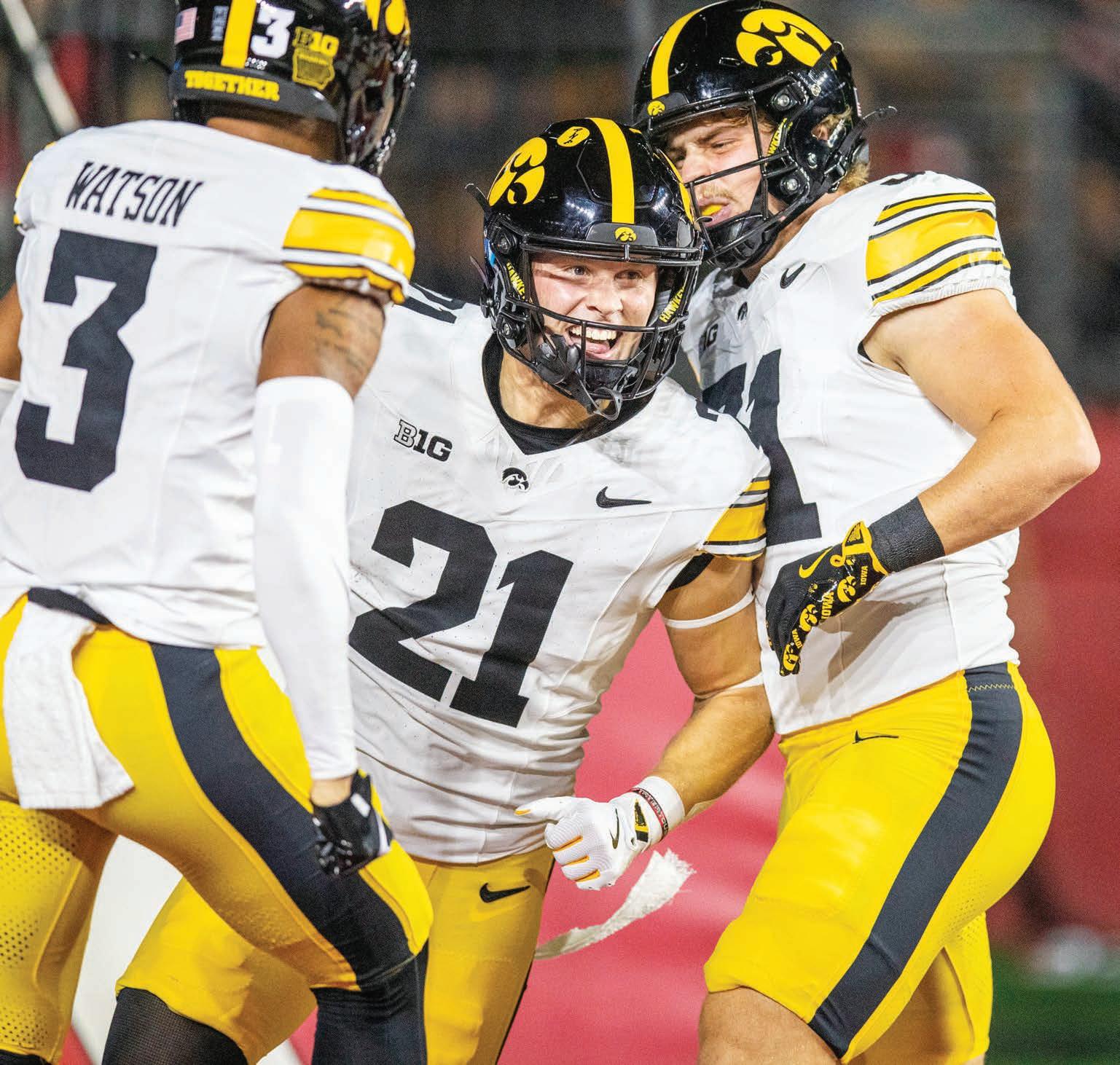





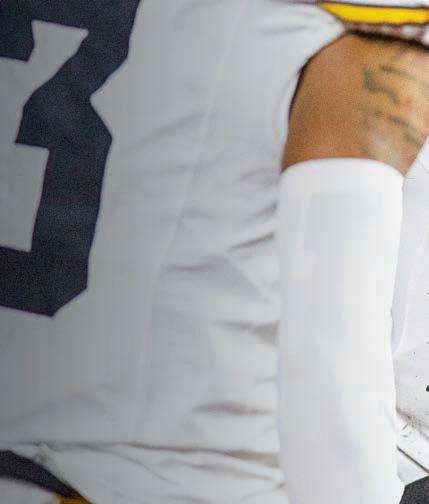
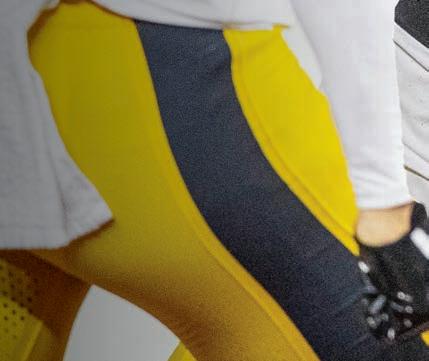















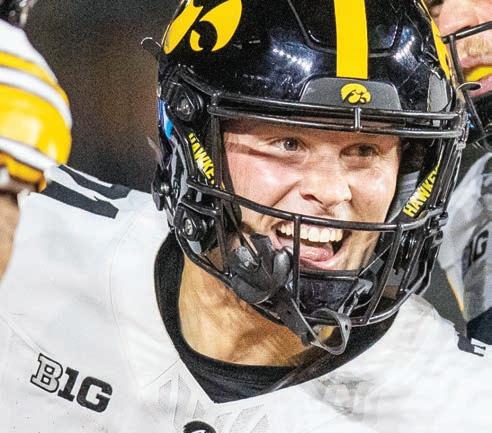
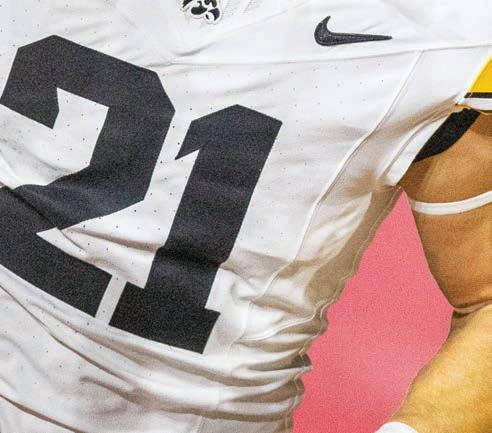
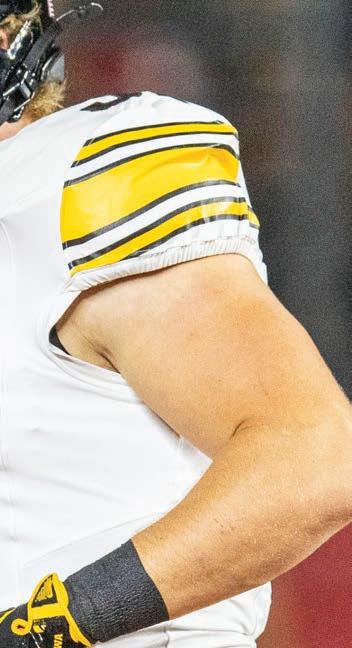

Confidence and passion marked Iowa returner Kaden Wetjen’s unconventional path to the Big Ten.
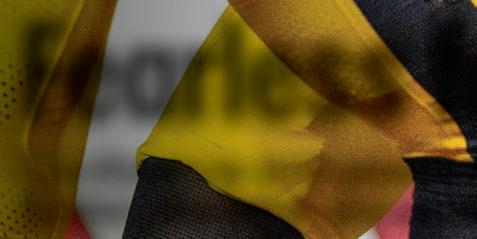
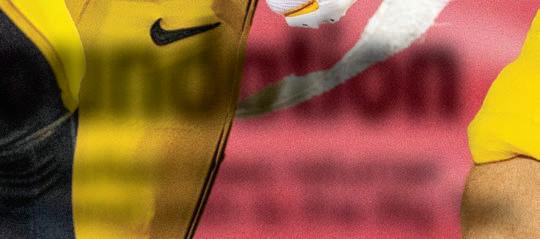
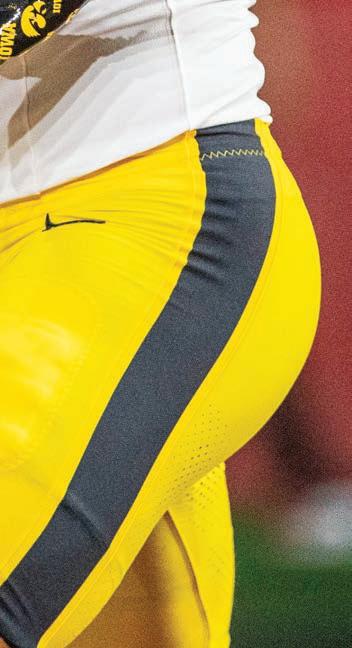

Leinart, and Sam Darnold have all been a part of that tradition over the years, and current signal-caller Jayden Maiava could be poised to join that group.


Iowa’s three losses have come by a combined 10 points this season, so you just wonder how much the Hawkeyes have left in the tank. The Iowa State and Indiana losses in September certainly hurt, but the Oregon loss was even more heartbreaking considering the Hawkeyes led late in the game.




Resilience has defined the Kirk Ferentz era, but Iowa can’t let last week’s difficult result bother them for the rest of the season. After all, the Hawkeyes still have a lot to play for despite being eliminated from College Football Playoff contention. Win out, and Iowa will have a chance for a 10-win season by winning a bowl game.
One of the primary factors for losing football games is being unable to stop the run, and that’s exactly what happened to Iowa against Oregon. The usually-stout Hawkeye defense allowed 261 rushing yards, with 118 of those yards coming from Noah Whittington. The Ducks used that potent rushing attack to set up their passing game, leading to crucial field goals.
Stopping USC’s run game this weekend will not be easy, as the Trojans have posted 200 rushing yards per contest. Ferentz and the coaching staff are definitely aware of the challenge in front of them, but knowing they have an experienced defensive line of Max Llewellyn, Aaron Graves, Ethan Hurkett, and Brian Allen should be comforting.


The third-year has thrown for over 2,600 passing yards – the second-most in the Big Ten – 17 touchdowns, and six interceptions this season. The interceptions have been a problem of late, but if there’s anyone that can fix them, it’s head coach Lincoln Riley – who has coached three Heisman Trophy winners during his career.
Maiava has thrown an interception in each of his last five games, including two back-breaking picks in a 10-point loss at rival Notre Dame on Oct. 18. Iowa’s defense missed an opportunity to close out the Oregon game, and you just have the feeling that defensive coordinator Phil Parker and his unit is hungry for revenge.












Deshaun Lee, T. J. Hall, Zach Lutmer, and Xavier Nwankpa continue to improve in the secondary, so expect them to bait Maiava into difficult decisions. Securing a takeaway will be crucial for the Hawkeyes’ chances for victory, but Iowa also needs to protect the football on offense. Kaden Wetjen’s red zone fumble in the fourth quarter played a large role in the Hawkeyes’ heartbreaking defeat to Oregon, and it will be tough to overcome any turnovers on the road this weekend.




If there’s one aspect that has defined USC football in the 21st century, it has to be explosive passing plays orchesrated by great quarterbacks. Carson Palmer, Matt
Iowa’s struggles on the West Coast are well-documented. Except for their 2019 Holiday Bowl victory - ironically over USC – the Hawkeyes have had a hard time finding wins. Iowa lost to a bad UCLA team at the Rose Bowl last year and it will now have to beat a talented USC squad. It’s not an impossible task, but expect the Hawkeyes’ struggles in Los Angeles to be a frequent discussion topic leading up to this one.
$2000 Cash Signing Bonus

Now Leasing for 2026-27
Kaden Wetjen has scored a rushing, receiving, and punt and kick return touchdowns.
Returning punts and kicks requires almost irrational confidence. One must field a wobbling ball booted over 60 feet in the air, deciding whether to catch it on the fly, scoop it off the bounce, or simply not touch it at all.
Should one attempt to run the ball back, their next challenge appears in a horde of 11 charging defenders whose sole purpose is to deliver a painful hit and remind the returner to think twice in the future. Evasion plans and escape routes are formulated in a split second, but improvisation is just as valuable.
A sizable return — or better yet, a touchdown — ignites a crowd and issues a tidal wave of momentum, but a muff or turnover will deflate optimistic energy just as quickly. A returner is a relative unknown until thrust into the spotlight for success or targeted by a cacophony of boos.
Volatility is the nature of the position, but Iowa’s Kaden Wetjen doesn’t mind an uncertain future. Overlooked coming out of high school, his path to Big Ten competition was blurry, but the undersized kid from Williamsburg, Iowa, had nothing to lose.
A common description of Wetjen’s play on the field is fearless, but he’s been living that interpretation for as long as he can remember.
“I wouldn’t say I really gained it,” he said. “It’s a weird thing to say, but just having confidence in myself that I’m going to catch the ball and do something with it instead of thinking I’m going to get tackled.”
Now at the pinnacle of his collegiate career with the Hawkeyes, Wetjen produces highlights on a near-weekly basis, but his past performances elicited less fanfare in front of smaller crowds. His All-American status at Iowa arrived from struggle, but also an unwavering belief.
Williamsburg is a half-hour drive west of Iowa City. Wetjen’s father, Lee, was a Michigan fan, so Iowa wasn’t at the top of Kaden’s mind growing up.
The real rivalry occurred between Wetjen and his two younger brothers. The trio is within five years of each other, but it was the eldest’s job to prove authority.
“Always just making sure they know he’s the toughest and the strongest out of all,” Wetjen’s mom, Lindsay, said.
Ironically enough, the 5-foot-9 Wetjen now literally looks up to his siblings, each of whom
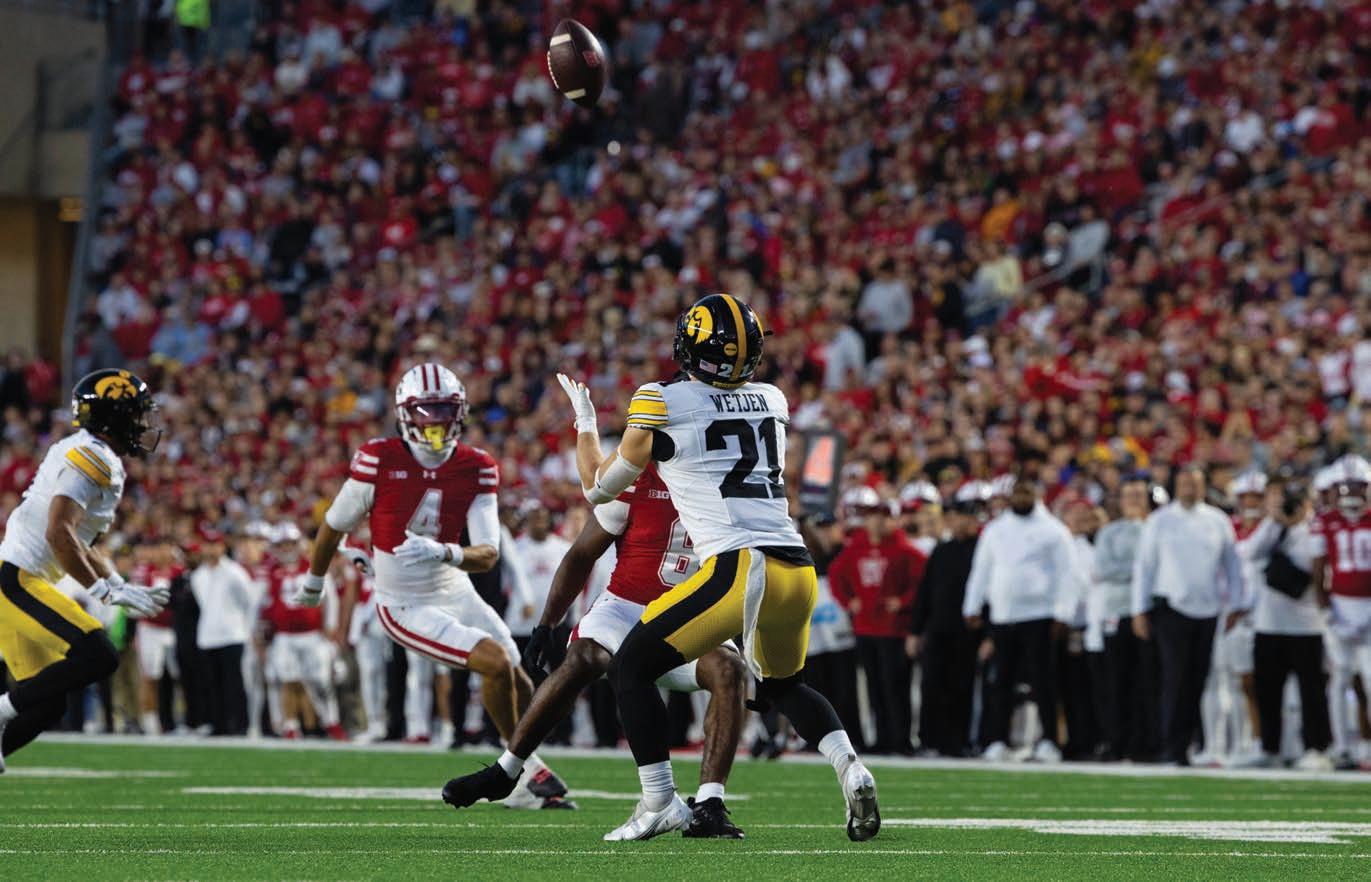
are over six feet tall. Back in the day, Wetjen wasn’t only the boss to his brothers, but a bother to his parents, who constantly reprimanded him for his rambunctious behavior.
“He was just a spitfire,” Lindsay remembered.
Wetjen’s behavior as a child even informally changed his identity. Instead of using his middle name of Derek, Wetjen’s grandfather opted for “Don’t.”
“It would always be, ‘Kaden don’t. Kaden don’t,’” Lindsay said.
Athletics was a key outlet for Wetjen’s energy, and with Lee as the running backs coach for Williamsburg High School, the football field offered opportunity. Then-head coach Curt Ritchie recalled a young Wetjen tagging along to practices, and soon found himself coaching him as a sophomore, when he began his career at cornerback. Wetjen recorded seven interceptions that season and began returning
kicks on special teams.
Ritchie began to realize Wetjen’s potential the following year, not just for the raw talent, but also for the passion for the sport. Ritchie means it in the “nicest way possible,” but Wetjen didn’t hesitate to celebrate or run his mouth.
“You have to love every part of preparation and competing,” Ritchie said. “He loved practice. He was never one who had a bad practice. He just came with a lot of excitement and had fun with it.”
Ritchie figured he should give his star the ball as much as possible, so Wetjen began playing more running back and doubled his touchdown production. In his senior season, he recorded 172 carries. The nextbest player had only 60.
Wetjen’s 20 rushing scores that year were just part of his 31-touchdown campaign.
“His senior highlight film, it was like a video game,” Ritchie said.
While short in stature, Wetjen’s speed alone rendered him a man among boys on the field. In a playoff game against top-ranked Clear Lake his senior year, he recorded 207 yards and three rushing touchdowns, averaging six yards per carry. Ritchie remembered each score being a pitch play to the left where Wetjen would cut the opposite direction, hit open field, and dash away untouched.
Wetjen took the same zig-zag approach to his returns on special teams. It’s not that Ritchie didn’t trust Wetjen in the role, but the coach often felt nervous watching Wetjen take risks on the field. Whether it was retreating backwards, catching the ball near defenders, or running laterally from sideline to sideline, Wetjen’s antics spiked his coach’s heart rate, but the returner’s frequent success offered relief.
“If there’s anybody who thinks he can beat 11 guys by himself, it’s probably him,” Ritchie said.
Despite prolific numbers, Wetjen’s size limited his college opportunities. Ritchie made as many calls as he could, but Wetjen’s only offers came from FCS schools, one step below his dream of playing at the FBS level. So once again, Wetjen took a risk, plunging himself into the unknowns of junior college.
After dominating on high school fields for Williamsburg, Wetjen found himself on similar ground 200 miles west of his hometown. Iowa Western Community College shares a home field with Lewis Central High School in Council Bluffs, Iowa. The two schools’ logos adorn each side of the turf. At first glance, junior college felt like a lateral move. Progress might feel stagnant. Scholarships and name-image-likeness deals don’t exist at junior college. Rather, as former Iowa Western tight end Frank Bierman described it, the love of the game is the top incentive. Keeping an eye on the next level is only natural, but the upper rungs might feel distant in hours-long bus rides to the middle of Kansas to play a game
position in high school. At Iowa Western, Wetjen could get reps at receiver while continuing to develop his returning skills.
While Wetjen caught passes in high school, his receiving skills needed work, a di cult process while also learning Iowa Western’s offensive scheme. ortunately for Wetjen, his returning skills were easily transferable and just as bold as before. Strohmeier recalled watching opposing coaches grow frustrated with their punters directing the ball to Wetjen, who he remembered as making only two fair catches.
“You have to have that no-fear mentality as a punt returner, and the best ones have that,” Strohmeier said.
Wetjen recorded 952 all-purpose yards in 2021, 588 of which came on returns, as the Reivers advanced to the national championship game.
Yet Wetjen’s impressive numbers still didn’t garner much attention. His only Division I offers were from UMass and Iowa as a walk-on. Once again, Wetjen stayed in his home state, but would face a far more uphill battle.
“That’s where a lot of people lose faith,” Bierman said. “They lose faith in themselves, faith in their journey, faith in the sport.”
Yet for both Bierman and Wetjen, now at Minnesota and Iowa, respectively, any discouragement was offset by the opportunity to prove themselves to schools that had ignored them.
Iowa Western head coach Scott Strohmeier emphasized this chance during his recruiting pitch. He said he was surprised few schools were interested in Wetjen, but added Wetjen’s size didn’t project as a running back, his primary
Wetjen didn’t see any game time with Iowa in 2022 before taking on the role of kick returner the following year. Appearing in each game, he ranked fourth in the Big Ten with 23.9 yards per return. On punt return, he not only split time with former Hawkeye Cooper DeJean, but received an unforgiving dose of Big Ten football reality.
In the regular season finale against Nebraska, with temperatures below freezing in Lincoln’s Memorial Stadium. Wetjen only returned two punts for 11 yards on the afternoon, but suffered a bent facemask from a Husker defender on a crushing tackle. Wetjen popped back on his feet, but the uniform malfunction told him all he needed to know about his level of competition.
“I was expecting it at some point, so at least I got it out of the way,” Wetjen said.
Hardly any defender obstructed Wetjen’s torrid path last season, as the returner led the nation in kick return yards with 1,055 and finished fifth with 28.1 yards per return. On punts, his 12.6 yards per return ranked third in the Big Ten and ninth in the nation.
Even to Iowa head coach Kirk Ferentz, these prolific numbers came as somewhat of a surprise.
“I don’t mind telling you, going into the season, I was a little worried about him,” Ferentz said last season. “Judgment, fielding balls. I’ll say that; I’ll admit it now. But he’s certainly earned my trust.”
Iowa senior kicker Drew Stevens served as Wetjen’s lifting partner in the weight room when the pair first got on campus. Stevens remembered Iowa special teams coordinator
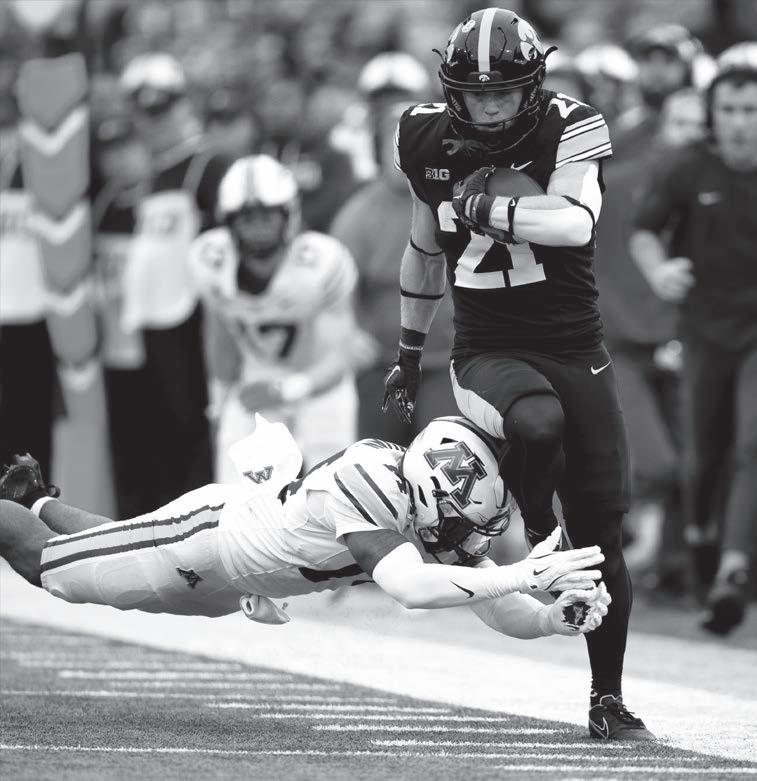
LeVar Woods constantly criticizing Wetjen for dropping balls or moving lackadaisically. Now, Woods is perhaps Wetjen’s biggest cheerleader, especially in the film room, where Wetjen’s highlights are broadcast.
“Coach Woods is taking his shirt off, he’s got a Wetjen jersey on [underneath],” Stevens said. “It’s just really surreal to see.”
Wetjen’s development earned him not only a permanent job as a returner but also a key piece to the Iowa offense in 2025. He became the first in program history to record a rushing, receiving, punt return, and kickoff return touchdown in the same season. Such versatility is based on the level of attention he demands from opposing defenders.
When lining up at receiver, enemy linebackers will call out a jet sweep, expecting Wetjen to receive a handoff from quarterback Mark Gronowski. In reality, Wetjen might just dash across the field and take a defender with him or sprint right, then plant and return to his left. In Iowa’s
victory over Minnesota on Oct. 25, Wetjen served as both a wideout threat and a decoy.
Wetjen lined up in the slot on Iowa’s opening drive, took a slow step across the line of scrimmage before sprinting across and receiving a screen pass from Gronowski for a 22-yard gain.
“It gets harder and harder to hide him,” Iowa offensive coordinator Tim Lester said of Wetjen. “But he’s starting to become a better wide receiver, which is fun.”
Once Iowa got inside Minnesota’s 20-yard line, Wetjen again lined up out wide to Gronowski’s left side, motioned to the right, then moved back toward the quarterback. The feint froze a Gopher defender and allowed Gronowski easy passage for a rushing touchdown.
Even with his expanded role in Lester’s scheme, Wetjen hasn’t lost the art of returning. Rutgers, Wetjen’s head barely moved as





























he took the Scarlet Knights’ offering the length of the field untouched for a touchdown.
When comparing Wetjen to past Iowa returners like Desmond King, Woods said Wetjen features superior breakaway speed, but now Wetjen uses his velocity more efficiently.
“When he came here, he was fast and he was going 100 different directions fast, but never the right direction,” Woods said. “I think he put in the time, learned and studied, and it’s become a thing for him.”
Woods sorts players into three categories — those who are interested, committed, or obsessed. He said Wetjen belongs in the third group. The returner doesn’t just show up to practice every day, but just like at Williamsburg, presents an outsized joy for the game despite its physical toll.
Teammates like Stevens took quick notice of such a demeanor.
“He’s always just got too good of an attitude.” Wetjen’s constant smile isn’t just a reminder of his gratitude, but his pride. Reflecting on his career, Wetjen said he knew he could play at the Division I level — he just had to prove it. The transition to the Big Ten didn’t bring immediate success, but now every time Wetjen fields the ball, the crowd expects instant action.
Watching from the stands a few seats apart from one another, Lee and Lindsay don’t harbor the same calm as their son on the field. Lindsay is easily stressed, while Lee grows frustrated when opponents opt not to kick in Wetjen’s direction.
Yet Wetjen, alone at the goal line, arms at his sides, can’t control the opportunities he receives. Rather, when a chance does appear, he seizes the moment without fear. Call it irrational confidence, but Wetjen accepts the spotlight.
“I just go back to the basic fundamentals and the stuff that got me from day one,” Wetjen said. “I don’t really think too much about what anyone else thinks about me.



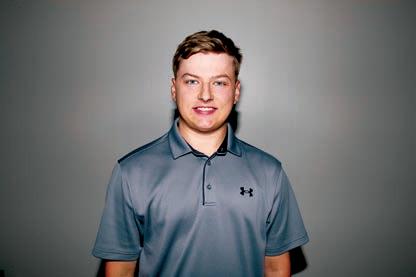
























The Daily Iowan sta shares their thoughts on this week’s upcoming games

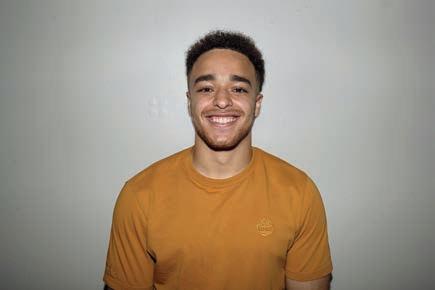






The fourth-year kicker discussed his favorite holiday, biggest pet peeve, and dream car.
The Daily Iowan : What is your favorite holiday and why?
Drew Stevens: Fourth of July. One, it’s summer, and two, it’s celebrating our country. It’s just celebrating being American.
Do you collect anything?
Probably wrist bands from the bars.
What is your favorite NFL team?
I grew up a Falcons fan, but I feel like I root for guys I know. I’ll root for the Bears now and the Lions, just because of Tory [Taylor] for the Bears and Jack Campbell for the Lions.
Who is your favorite NFL player?
Growing up, I liked watching Julio Jones play.
What is your biggest pet peeve?
My biggest pet peeve is whenever a person says something they don’t mean. For example, whenever I don’t























do something my mom wants me to, she’s like, “Oh, it’s fine.” I hate that because I know it’s not fine. I know she wants me to do it, but it just irritates me that she’s not saying what she means.
What is your dream car?
A black McLaren.
What is your dream vacation?
Probably that place where there are those huts on top of the water, like a hotel. And there’s clear, blue water.

After ba ling a rare brain cancer and relearning how to walk, Blake Bonta is now two years cancer-free. And raising over $100,000 to help other kids fight the same disease.
“After surgery, he couldn’t reach to grab a cup,” Justin said. “And he had to learn to walk again.” Blake never complained. He never cried. And now he is two years cancer-free.

Blake Bonta’s birthday party ended in a headache. Two days later, Blake couldn’t walk.
“It was almost like he was intoxicated,” Blake’s father, Justin Bonta, said to describe his then nine-year-old’s stumbling. Blake was also regularly getting sick at school. Assuming it was anxiety-induced, the Bontas began to homeschool their son.
But it quickly became clear that something far more serious was happening.
A trip to Blank Children’s Hospital in Des Moines, Iowa, taught the Bonta family that Blake had a mass in the back of his brain. Soon after, the Bontas were sent to the University of Iowa’s Stead Family Children’s Hospital, where doctors diagnosed Blake with a rare form of brain cancer called Medulloblastoma.
This type of cancer starts in the cerebellum, the part of the brain that controls movement, balance, and coordination. As the tumor grows, it can block the flow of the fluid that protects the brain and spine. Unlike some brain tumors that stay in one place, Medulloblastoma can spread to other parts of the body. In Blake’s case, the cancer had already spread to his spine. Treatment began quickly. Blake underwent multiple surgeries, six weeks of radiation, and six months of chemotherapy.
During his days spent at Stead Family Children’s Hospital, Blake said he enjoyed drinking hot chocolate, ordering everything on the menu, looking at the sky, and watching movies.
“And getting chemotherapy five days a week,” ustin Bonta added.
In the hardest moments, Blake had a loyal visitor to lift his spirits: the family’s dog, Poppy. She became a bright spot in the hospital halls during Blake’s 110-day stay, a reminder of home and hope.

Today, Blake’s life has returned to a new normal of playing video games, building Legos, and spending time with family. When Blake returns back to Stead Family Children’s Hospital, his care team conducts two-hour MRIs to ensure the tumor has not returned.


“He’s an absolute warrior for everything he went through,” Justin Bonta said. “He did it with a smile on his face the entire time.”
That same strength drives Blake’s next mission: making sure other kids don’t have to spend as many days in the hospital as he did. Through fundraising, Blake has already raised over $100,000 for pediatric brain tumor research.
“That’s my life goal.”


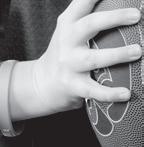
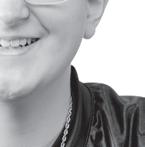
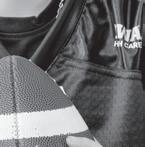
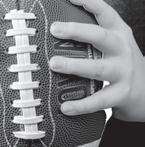
















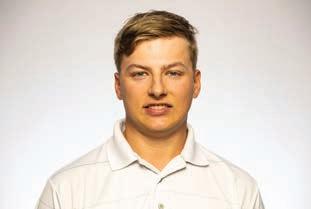







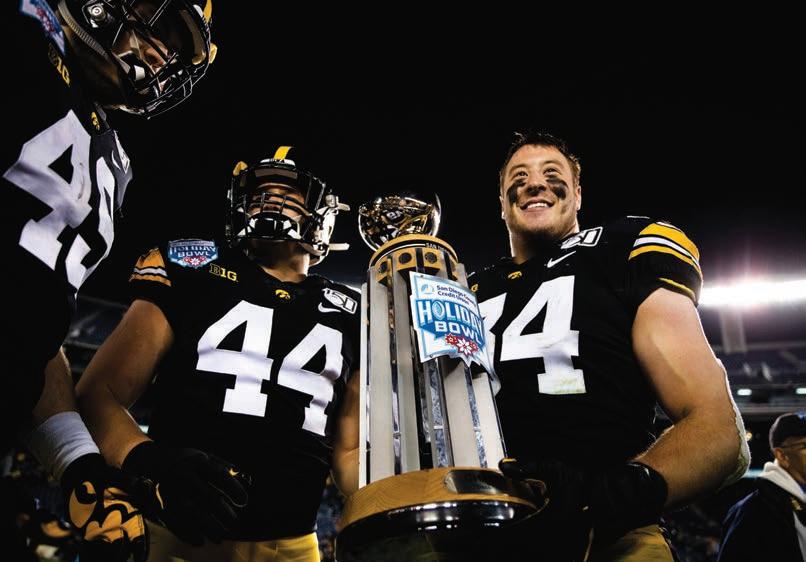
After losing three close games to ranked Big Ten foes, the 2019 Iowa football team headed west to San Diego for the Holliday Bowl against No. 22 USC. The Trojans entered the game as a one-point favorite, but the Hawkeyes dominated the contest from start to finish, scoring touchdowns on their first five possesions on the way to a 49-24 victory and a 0- finish.








